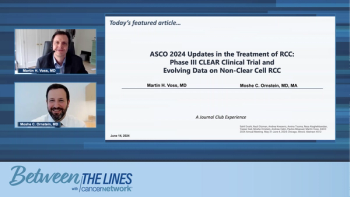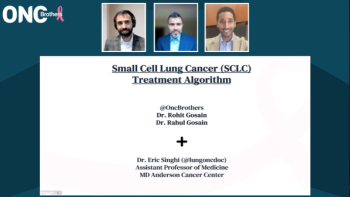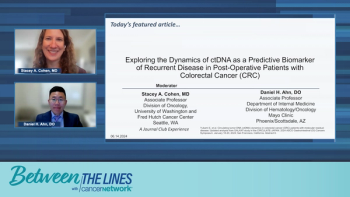
Naresh Bumma, MD, and Hans Lee, MD, recap recent updates on the MagnetisMM-30 an MagnetisMM-32 studies investigating elranatamab, a BCMA-directed bispecific antibody.

Your AI-Trained Oncology Knowledge Connection!


Naresh Bumma, MD, and Hans Lee, MD, recap recent updates on the MagnetisMM-30 an MagnetisMM-32 studies investigating elranatamab, a BCMA-directed bispecific antibody.

Frits van Rhee, MD, PhD, and Cesar Rodriguez, MD, provide key takeaways on findings from the PERSEUS trial and discuss unmet needs that remain in the multiple myeloma treatment landscape.

Investigators are assessing the use of IORT in patients with borderline resectable or unresectable pancreatic cancer as part of the phase 2 PACER trial.

Key opinion leaders analyze recent findings from the BESPOKE study.

The panel examines recent studies from the INTERCEPT program investigating the utility of circulating tumor DNA (ctDNA) for minimal residual disease (MRD) detection in colorectal cancer (CRC).

Renal cell carcinoma specialists provide a comprehensive overview of chromophobe renal cell carcinoma (ChRCC), including its definition, background, and distinctive characteristics.

Key opinion leaders examine the Phase II PAPMET clinical trial, focusing on its design and progression-free survival outcomes.

The panel concludes its discussion with insights on practices for educating health care teams on CAR T-cell therapy administration, highlighting the evolving role of advanced practice providers.

The panel concludes by offering key takeaways on the treatment of patients with relapsed/refractory multiple myeloma who receive CAR T-cell therapy.

The approval for epcoritamab in patients with R/R follicular lymphoma was supported by encouraging efficacy findings from the phase 1/2 EPCORE NHL-1 trial.

The Oncology Brothers and Eric Singhi, MD, provide clinical insights on the treatment of patients with small cell lung cancer with driver mutations.

Eric Singhi, MD, joins the Oncology Brothers to discuss adverse event management practices for patients with small cell lung cancer.

Medical oncologists provide comprehensive insights on treatment practices for patients with extended-stage small cell lung cancer.

Following recent data from the ADRIATIC study, the Oncology Brothers and Eric Singhi, MD, discuss the role of prophylactic cranial irradiation (PCI) in patients with small cell lung cancer.

Eric Singhi, MD, joins the Oncology Brothers, Rahul Gosain, MD, and Rohit Gosain, MD, to discuss the treatment algorithm for patients with limited-stage small cell lung cancer (SCLC), highlighting the ADRIATIC study.

GI medical oncologists review recent findings from the INTERCEPT study evaluating the prognostic performance of circulating tumor DNA in clinical practice.

Stacey A. Cohen, MD, and Daniel H. Ahn, DO, discuss the role of circulating tumor DNA (ctDNA) as a biomarker in colorectal cancer and provide clinical insights on screening modalities.

A phase 1/2 trial assessed the use of menin inhibitor DSP-5336 in patients with acute leukemia overexpressing HOXA9 and MEIS1.

A phase 1 trial assessed the use of PSCA-directed CAR T cells in patients with metastatic castration-resistant prostate cancer.

A pooled analysis trial assessed the impact of acalabrutinib in patients with chronic lymphocytic leukemia across treatment lines.

Experts on multiple myeloma discuss the safety profile of DARA-VRd in patients with newly diagnosed multiple myeloma.

Samer Al'Hadidi, MD, provides an overview of recent updates presented at ASCO 2024 from the MajesTEC-1 trial evaluating teclistamab in patients with relapsed/refractory multiple myeloma.

Myeloma specialists provide comprehensive insights on key data from the PERSEUS trial evaluating MRD status in patients receiving DARA-VRd and VRd.

Hans Lee, MD, discusses recent updates from the MonumenTAL-2 study investigating talquetamab in patients with relapsed/refractory multiple myeloma.

Medical experts evaluate unmet needs, key insights from the Phase 3 ECHO trial, and potential obstacles in integrating the findings into existing treatment protocols.

Medical experts analyze and provide insights on safety findings from the Phase 3 ECHO trial, offering their professional interpretations of the data.

The key opinion leaders share their approaches for communicating about circulating tumor DNA and minimal residual disease to patients, emphasizing the significance of ctDNA testing in detecting MRD.

Experts outline circulating tumor (ct) DNA analysis, detailing the two main techniques and their respective advantages and disadvantages.

Findings from a phase 1 study may inform future trial designs intended to yield longer responses with PSCA-targeted CAR T cells.

Experts on multiple myeloma provide clinical insights on unmet needs associated with CAR T-cell therapy, focusing on patient access across academic and community settings.